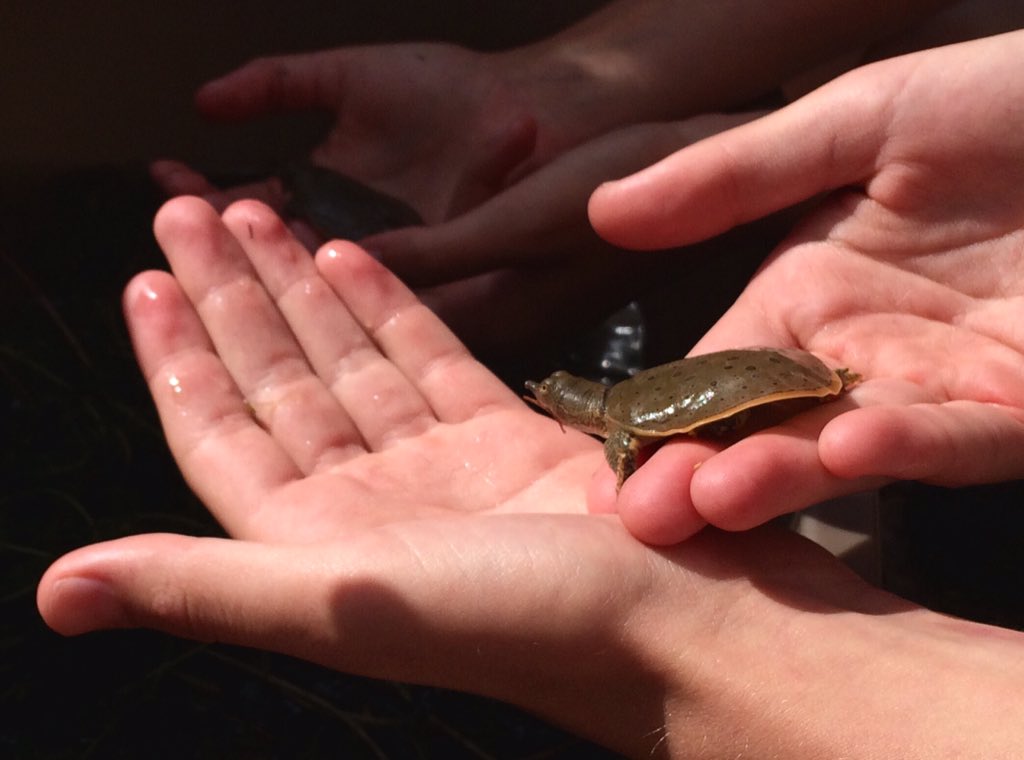Officials with the Upper Thames River Conservation Authority (UTRCA) released 75 baby turtles back into the Thames River on Wednesday, a fraction of the thousands set to be returned to the river over the course of the season by the authority’s Species at Risk Reptile Team.

The release of the baby turtles comes during a record year for turtle-hatching, UTRCA officials said, adding it’s great news for the sustainability of the local spiny softshell turtle population, a species listed both by the provincial and federal governments as endangered.
“Over the season, there’ll be approximately 6,000 to 6,500 eastern spiny softshell turtles released back into the wild,” said Travis De Joseph, a volunteer intern with the team, also known as “the Turtle Team.”
WATCH: Members of the UTRCA’s Species at Risk Reptile Team release 75 baby turtles into Thames River.
The team has been working to protect the eggs of the local spiny softshell population since the 1990s after early studies along the Thames revealed almost zero turtle egg survival, UTRCA officials said in a statement.
According to the province, habitat degradation is the biggest threat to the species, brought on by riverbank stabilization, shoreline development, water level changes, dams, and recreation. The species also sees high mortality due to collisions with motorboats and trapping.
- 2021 heat dome fuelled by climate change, intensified wildfire risk: study
- B.C. introduces legislation recognizing Haida Gwaii Indigenous title
- Whale experts confident B.C. orca calf will survive, find family if rescue plan succeeds
- Chemical plant shuts down after high benzene levels detected near Ontario First Nation
READ MORE: How an Ontario community set a global example for saving turtles on a deadly road
Invasive species also take over where the turtles nest, and poaching by humans, often for the illegal pet trade, for food, or for medicinal purposes, has had a large impact on the species’ population, UTRCA officials said. It’s because of this that officials don’t like to make public where along the river the turtles are discovered and released.
Nests, the conservation authority says, are also vulnerable to predators including raccoons and foxes, and only a small number of baby turtles reach adulthood.
“We actually have nesting sites designated to search, and we look for turtle tracks and we carefully dig them up with a shell… and then we collect them, lightly pack them with some of the sand in the area, and then bring them back here to incubate,” De Joseph said, referring to the UTRCA’s Watershed Conservation Centre at the Fanshawe Conservation Authority.
“Usually we collect the eggs, incubate them — the spiny softshell, for example, will take 55 to 65 days to hatch — and then within one to two days we’ll release them back into the wild.”
De Joseph said the team tries to simulate natural conditions as much as possible, and as a result, don’t head start any of the baby turtles. The turtles are returned back into the location where the eggs were retrieved.
READ MORE: Over 2,000 turtle eggs incubating at Peterborough’s turtle conservatory
The 20-year-long recovery effort has resulted in an increase in the turtle’s population in all age classes along the river.
According to the UTRCA, the team is one of the longest-running and successful reptile research, recovery, and education programs in the country.









Comments